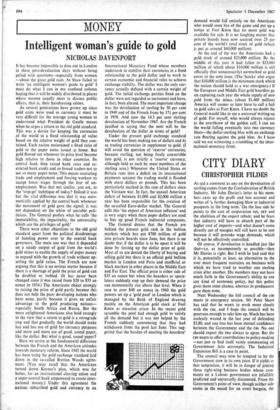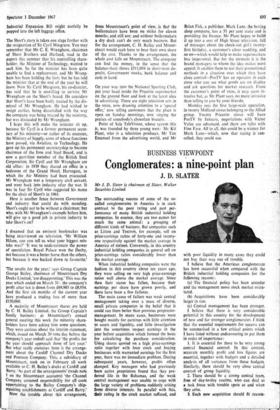CITY DIARY
CHRISTOPHER FILDES
As sad a comment as any on the devaluation of sterling comes from the Confederation of British Industry. Mr John Davies's letter to his mem- bers casts up the profit and loss account and writes of 'a further damaging blow at industrial prospects in the long term.' On the loss side he points to the cost of corporation tax, SET and the abolition of the export rebate; and he fears that industry will have to absorb part of the higher cost of imports—and what doesn't come directly out of margins will still have to be met because it will provoke wage demands, which will not be effectively controlled.
Of course, if devaluation is handled just like that—i.e. as incompetently as possible—then Mr Davies is right. But I wish he had said that it is, potentially at least, an alternative to the ever more frequent restraints on business with which we have tried to weather one sterling crisis after another. His members may not have much faith in the Government's ability to run any kind of economic policy, but this policy gives them some chance, whereas its predecessor gave them none.
Next Wednesday the full council of the CBI meets in emergency session. Mr Peter Shore has said that he wants to work more closely with the an, and I hope the council will be generous enough to take him up. Much has been uselessly wasted in the last year of defending $2.80, and one loss has been mutual confidence between the Government and the an. No one should expect the two always to agree. But the on wants to offer contributions to policy-making —not just to find itself vainly commenting on Government faits accomplis. The Industrial Expansion Bill is a case in point.
The council may now be tempted to let the Government stew in its own juice. If it yields to that temptation, it will be in danger of joining those right-wing business bodies whose com- ments on a Labour government are infallibly predicted and universally discounted. From the Government's point of view, though neither side seems in the mood for an overt bargain, the Industrial Expansion Bill might usefully be popped into the left luggage office.
The Short's story is taken one stage further with the resignation of Sir Cyril Musgrave. You may remember that Mr C. E. Wrangham, chairman of Short Brothers and Harland, read in the papers this summer that his controlling share- holder, the Minister of Technology, wanted to sack him. So far the minister has been quite unable to find a replacement, and Mr Wrang- ham has been holding the fort; but he has told the minister that at the end of the year he will leave. Now Sir Cyril Musgrave, his co-director, has said that he is unwilling to survive Mr Wrangham on the Short's board. He considers that Short's have been badly treated by the dis- missal of Mr Wrangham. He had wished to resign earlier, being dissatisfied with the way the company was being treated by the ministry, but was dissuaded by Mr Wrangham.
I hope this will make the minister sit up, because Sir Cyril is a former permanent secre- tary of his ministry—or rather of its ancestor, the Ministry of Supply, some of whose functions have passed, via Aviation, to Technology. He gave up his permanent secretaryship to become chairman of the Iron and Steel Board, and is now a part-time member of the British Steel Corporation. Sir Cyril and Mr Wrangham are old allies: in 1939 -they shared an office in a bedroom of the Grand Hotel, Harrogate, to which the Air Ministry had been evacuated. Mr Wrangham was a temporary civil servant, and went back into industry after the war. It was in fact Sir Cyril who suggested his name for the chair of Short's in. 1961.
Here is another fence between Government and industry that could do with mending. Short's ought not to be without a chairman; but who, with Mr Wrangham's example before him, will give up a good job in private industry to take Short's on?
I dreamed that an eminent bookmaker was being interviewed on television. 'Mr William Hilson, can you tell us what your biggest mis- take was?' It was to underestimate the power of speculation. Royal Palace won the Derby, not because.it was a better horse than the others, but because it was backed down to favourite.'
The results for the year,' says Group Captain George Bailey, chairman of Mountstuart Dry Docks Limited, `aredisappointing.' This was the year which ended on March 31: the company's profit after tax is down from £69,983 to.£8,954. And the first six months of the current year have produced a trading loss of more than 1150,000.
A majority of Mountstuart shares are held by C. IL Bailey Limited, the Group Captain's family business at Mountstuart's annual general meeting this week the minority share- holders have been asking him some questions. They were curious about the interim statement, which, issued on March 30 (one day before the company's year ended) said that 'the profits for the year should approach those of last year.' But what really exercises them is the arrange- ment about the Cardiff Channel Dry Docks and Pontoon Company. This, a subsidiary of Mountstuart, took on in February all work available to C. H. Bailey's docks at Cardiff and Barry. 'As part of the arrangements' (reads note I on the Mountstuart accounts) 'the Channel Company assumed responsibility for all costs appertaining to the Bailey Company's ship- repairing establishments at Cardiff and Barry.' Now the trouble about this arrangement,
from Mountstuart's point of view, is that the boilermakers have been on strike for eleven months, and still are; and without boilermakers a dry dock can't do very much business. But for the arrangement, C. H. Bailey and Mount- stuart would each have to bear their own share of the cost. Thanks to the arrangement, the whole cost falls on Mountstuart. The company can find the money, in the sense that the balance-sheet shows f511,604 in short-term de- posits, Government stocks, bank balance and cash in hand.
On your way into the National Sporting Club, put your head inside the Pricerite supermarket on the ground floor and look at the latest idea in advertising. There are eight television sets in the store, now drawing attention to a 'special offer,' now telling customers that the place is open on Sunday mornings, now singing the praises of somebody's chocolate biscuits. . . .
Point of Sale TeleVision, whose system this is, was founded by three young men : Mr Kit Plant, who is a television producer, Mr Tim Emanuel from the advertising world, and Mr
Brian Fisk, a publisher. Mark Lane, the betting shop company, has a 51 per cent stake and is providing the finance. Mr Plant hopes to build it up into a sort of High Street television, full of messages about the check-out girl's twenty- first birthday, a customer's silver wedding, and so on—which would help to make supermarkets less' impersonal. But for the moment it is the brand managers to whom the idea makes most appeal. It enables them to test their promotional methods in a situation over which they have close control—PosTV has an operator in each store who can see what goods are on display and ask questions for market research. From the customer's point of view, it may seem in- trusive but, as Mr Plant says, no more intrusive than selling to you by your fireside.
Monday sees the first large-scale operation, in twenty Midland stores belonging to the Allied group. Twenty Pricerite stores will have PosTV by January, negotiations with Victor Value are advanced, and there are talks with Fine Fare. All in all, this could be a winner for Mark Lane—which, now that racing is can- celled, they could use.



































 Previous page
Previous page